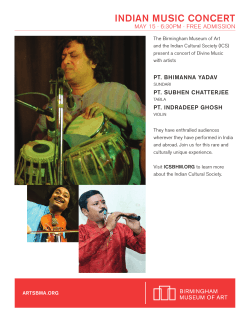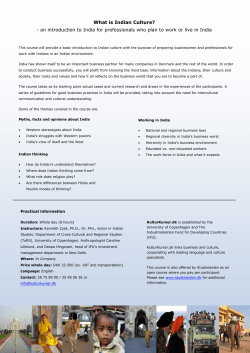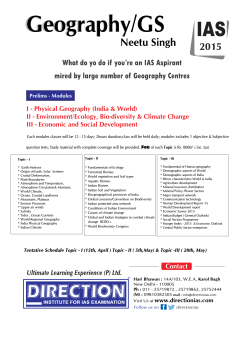
Concept_note_and_Agenda_
CONCEPT NOTE European Science, Technology and Innovation Platform in India EU STI WORKSHOP 2015 15th April 2015, New Delhi HOW CAN EUROPEAN INSTITUTIONS AND INDUSTRY ENGAGE WITH INDIA’S NEW RESEARCH UNIVERSITIES? 1 - Introduction Several European research organizations, universities, and initiatives involved in supporting cooperation at EU scale, and private companies have established offices or laboratories in India. The “European Science, Technology and Innovation Platform in India”i has been formed by a group of European organizations to: Enable information, knowledge and experiences sharing among the members; Increase their collective and individual visibility; and Act as a single point of entry for industries and public organizations wanting to establish themselves in India. The Platform was launched in early 2013 under the New INDIGO initiative and is currently funded under the INDIGO-POLICY1 initiative. 2 - Purpose of the workshop The EU STI Workshop 2014 will be the second event organized by the EU STI Platform after the successful forum organized in September 2013 on “Public–Private Partnership in Innovation in India and in Europe”. The overarching aim of the workshop will be to showcase the Platform and its members by bringing together the members and their existing networks, EU companies carrying out research in India, EU Science Counselors, innovative industries in India and key Indian institutional stakeholders and researchers to address a topic of mutual interest. 1 INDIGO-Policy is a BILAT project (2013-2016) funded by the European Commission under the EU Seventh Framework, which is composed of 8 European and Indian partners. This project aims to support the advancement of policy cooperation between India and Europe in Research and Innovation. The topic: “How can European institutions and industry engage with India’s new research universities?” has been chosen because: The Higher education sector is booming in India to respond to the massive increase in tertiary age cohort in the population;2 New research universities are being created in both the public and private sectors; Some of these new research universities are developing novel approaches to teaching and learning and engaging with business and industry; European companies are actively seeking to establish long term, sustainable partnerships with Indian research institutions. European firms wanting to establish long term partnerships with Indian higher education institutions have faced a number of barriers in the past. These may have included issues such as: mismatch of expectations; lack of understanding of respective perspectives and needs; and cultural issues. It may be that some of the new higher education institutions that have been or, are in the process of being, created will approach engaging with European firms and institutions in a qualitatively different manner. The expectation is that they will be keener to develop themselves as research and innovation hubs. Therefore, they may be more inclined to take a positive view to developing international partnerships, in particular, with European firms and institutions. The specific objectives of the EU STI workshop are to: Bring together European firms and institutions with stakeholders from the new research universities in India; To understand how the new research universities will fit into the Indian innovation ecosystem; Foster a dialogue between European firms and institutions with a view to establishing long term, sustainable partnerships Expected outcomes 2 Bring together European firms and institutions with stakeholders from the new research universities in India Better understanding of how the new research universities will fit into the Indian innovation ecosystem. New relationships developed between participants http://www.britishcouncil.in/sites/britishcouncil.in2/files/understanding_india.pdf 3 – Structure of the Workshop The event will be held in Delhi at Maharani Hall, Hotel “The Claridges” on 15th April 2015. The programme will start at 13:00 and proceed as follows: 13.00-14.30 Registration and Lunch 14.30- 14.40 Introduction – Expectation and outputs Dr Srini Kaveri, CNRS 14.40 -14.50 Welcome address Dr João Cravinho, Ambassador of the European Union 14.50 -15.10 Key note: New initiatives in India that should be aligned with EU Professor L S Shashidhara, IISER Pune 15.10- 15.30 Key note: Working with the Indian Innovation Mr Poul V Jensen, EBTC Ecosystem: Opportunities and Risks 15.30-15.50 Key note: University-Industry Knowledge Transfer Mr. Denis Dambois, EU in the Context of EU Research Policy 15.50 -16.00 Q&A 16.00 -16.30 Coffee Break and Networking Session 16.30 -17.30 Moderated Panel Discussion Dr Sadhana Relia, DST TBC Dr Amitava Bandopadhyay, CSIR TBC Dr Purnima Rupal, CSIR Professor Rupamanjari Ghosh, Shiv Nadar University Professor L S Shashidhara, IISER Pune Mr Poul V Jensen, EBTC Mr Denis Dambois, EU Mr Firoz SIDDIQUI, FAURECIA Representative from PHILIPS TBC Representative from Schneider Electric TBC 17.30-17.45 Rapporteur’s comments Mr. Nicolas Booker, IndoGenius 17.45-18.00 i Wrap up and Next Steps Dr Srini Kaveri, CNRS Members of European Science, Technology and Innovation Platform in India : European Business Group (EBG), British Council,Centre National d’Etudes Spatiales (CNES), Centre National de la recherche Scientifique (CNRS), Commissariat à l'énergie atomique et aux énergies alternatives (CEA), Deutsche Forschungsgemeinschaft (DFG) and Deutsche Wissenschafts- und Innovationshaus (DWIH), Deutsche Gesellschaft für Internationale Zusammenarbeit (GIZ), Deutscher Akademischer Austauschdienst (DAAD), Euraxess links India, European Business and Technology Centre (EBTC), Finnish Innovation Network (FinNode), Forschungszentrum Jülich GmbH, Fraunhofer, Freie Universität Berlin, India Platform Ugent, Maastricht Education and Research Center (MERC), Nordic Centre in India , Research Councils UK , Science Foundation Ireland (SFI), ISCA, University of Birmingham, University of Cologne, University of Edinburgh, University of Heidelberg.
© Copyright 2025











